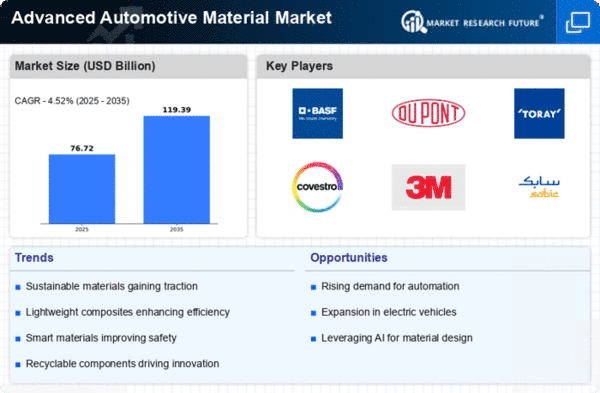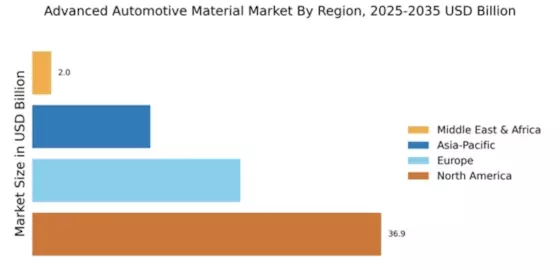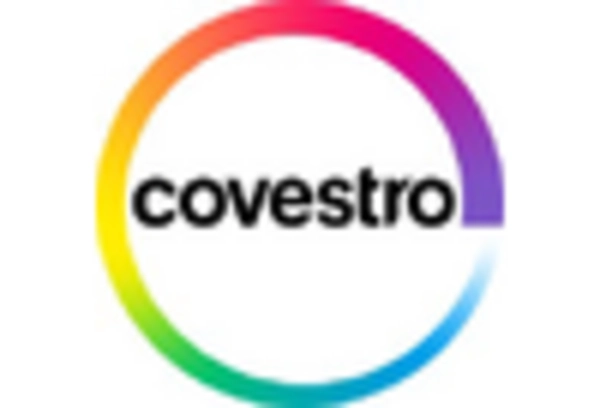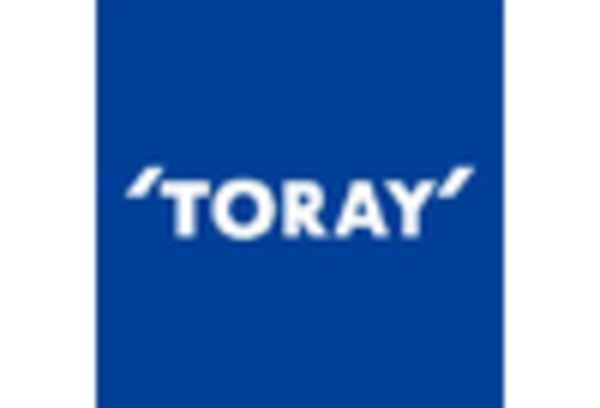Growing Demand for Lightweight Materials
The Global Advanced Automotive Materials Market Industry experiences a notable shift towards lightweight materials, driven by the automotive sector's need for improved fuel efficiency and reduced emissions. Lightweight materials such as aluminum and carbon fiber composites are increasingly utilized in vehicle manufacturing. For instance, the adoption of aluminum in vehicle structures can lead to weight reductions of up to 50% compared to traditional steel. This trend is expected to contribute to the market's growth, with projections indicating a market value of 73.4 USD Billion in 2024, reflecting a robust demand for innovative materials that enhance performance while adhering to stringent environmental regulations.
Increasing Investment in Electric Vehicles
The Global Advanced Automotive Materials Market Industry is significantly impacted by the rising investment in electric vehicles (EVs). As automakers pivot towards electrification, the demand for advanced materials that enhance battery performance and vehicle efficiency is surging. Materials such as lightweight composites and advanced thermal management solutions are critical in optimizing EV performance. The market is expected to reach 73.4 USD Billion in 2024, driven by this investment trend. Furthermore, as the EV market expands, the need for innovative materials that support longer battery life and improved range becomes increasingly vital, indicating a promising future for advanced automotive materials.
Regulatory Pressure for Emission Reductions
The Global Advanced Automotive Materials Market Industry is increasingly shaped by regulatory pressures aimed at reducing vehicle emissions. Governments worldwide are implementing stringent regulations to curb greenhouse gas emissions, prompting manufacturers to seek advanced materials that facilitate compliance. For instance, lightweight materials contribute to lower fuel consumption, thereby helping automakers meet regulatory standards. The anticipated growth of the market to 119.4 USD Billion by 2035 underscores the urgency for manufacturers to adopt innovative materials that not only enhance vehicle performance but also align with global sustainability initiatives. This regulatory landscape is likely to drive investment in advanced materials research and development.
Consumer Preference for Sustainable Vehicles
The Global Advanced Automotive Materials Market Industry is witnessing a shift in consumer preferences towards sustainable vehicles. As awareness of environmental issues grows, consumers increasingly favor vehicles that utilize eco-friendly materials and technologies. This trend encourages manufacturers to incorporate advanced materials that reduce environmental impact, such as bio-based composites and recycled materials. The market's projected growth to 119.4 USD Billion by 2035 reflects this changing consumer landscape, as automakers strive to meet the demand for greener alternatives. Consequently, the integration of sustainable materials not only enhances brand reputation but also aligns with broader societal expectations regarding environmental responsibility.
Technological Advancements in Material Science
The Global Advanced Automotive Materials Market Industry is significantly influenced by ongoing technological advancements in material science. Innovations such as the development of high-strength steel and advanced polymers are enhancing the performance and durability of automotive components. For example, the introduction of thermoplastic composites allows for faster production cycles and improved recyclability. These advancements not only meet the evolving demands of manufacturers but also align with sustainability goals. As a result, the market is anticipated to grow at a CAGR of 4.52% from 2025 to 2035, indicating a sustained interest in cutting-edge materials that support the automotive industry's transition towards more sustainable practices.


















